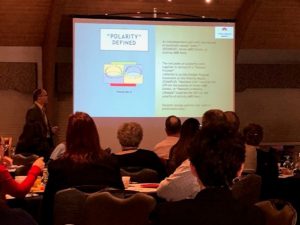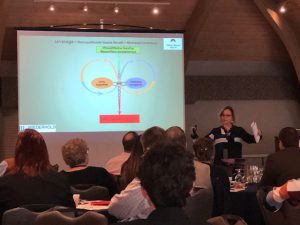In April of 2019, WellSpan Physician and Nursing leaders were brought together for a transformative Day of Learning conducted by SixSeed Partners.

For over a year SixSeed Partners worked with system senior leaders to increase the capacities for transformational change and leveraging polarities to create and measure sustainable performance. As the work of polarities had begun to permeate throughout the system, the was an expressed need to increase nursing and physician leadership knowledge about the power of polarities.
Educating Nursing Leadership AND Physician Leadership
Polarities are interdependent pairs of values or points of view that may appear as opposite, but when leveraged together can produce powerful outcomes. Prior to the workshop,
WellSpan choose four polarities to concentrate their work:Joy Goldman, RN, MS, PCC discusses the mindset shift to AND thinking.

- Centralized and Decentralized- Focus on the independent business units needs AND systems opportunities;
- Continuity and Transformation- Keeping the legacy and traditions of the past AND transforming for the future;
- Tactical and Strategic- Increasing leadership capacity to think tactically AND strategically at the same time; and
- Margin and Mission- Optimizing the financial health AND mission goals for individuals, systems and teams.
The physicians and nursing leaders learned that each polarity was not a problem to be solved, but a mindset to embrace, thus the “AND” mindset was put in motion for the group. Interactive practice tools were given to help mobilize teams toward forward movement when they experienced repeated cycles of interdependent tension.
Perhaps the most significant take-away was the provision of language for the leaders to hold and invite numerous perspectives, which support AND thinking and leading within complexity.
_____________

“It was so helpful to hear what others have learned. I’m a new director, so to hear from other directors and doctors was so helpful for me in my new role.” — Nursing Director

